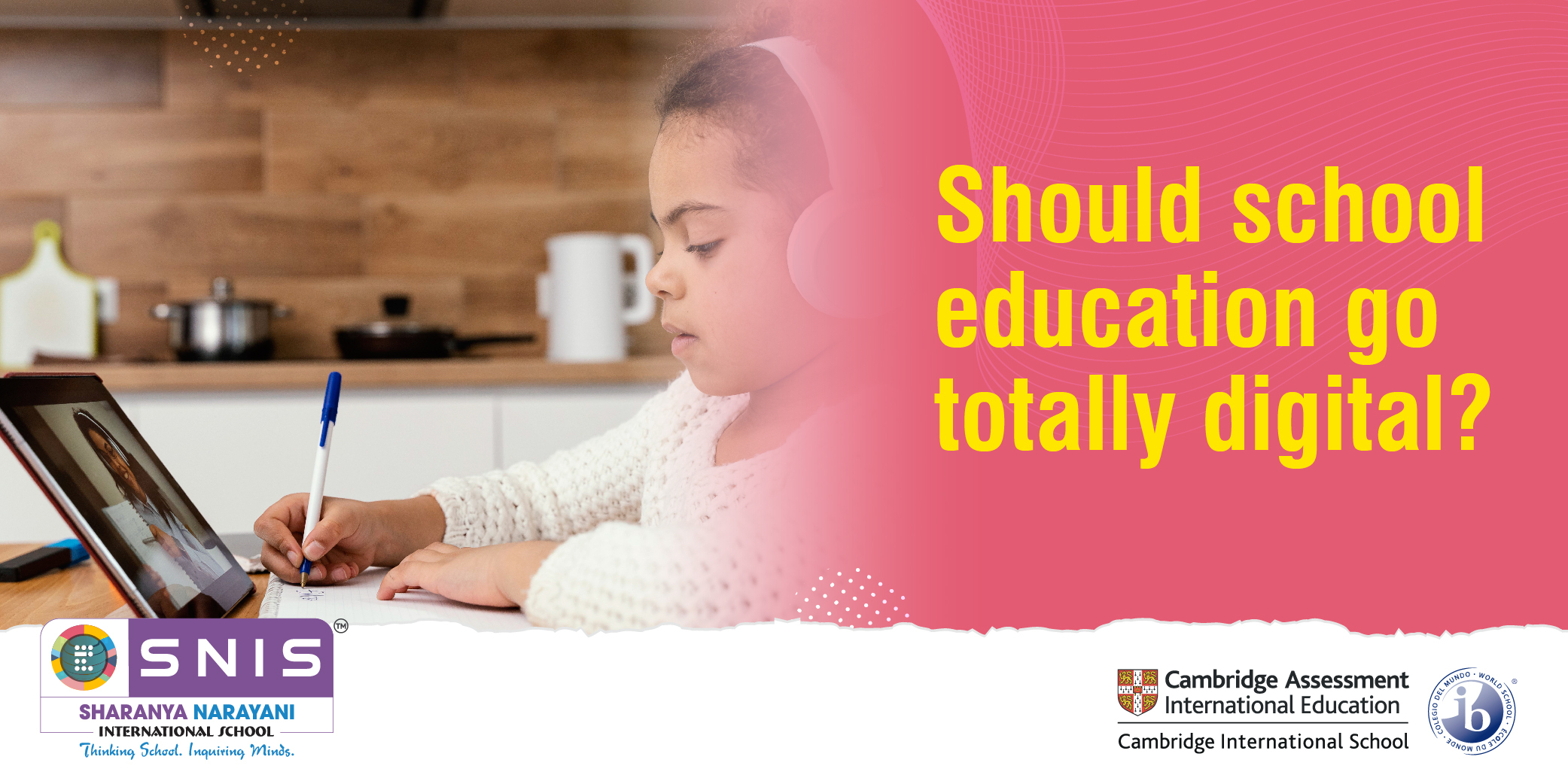
05 Oct Should school education go totally digital?
Across the globe, 80% of companies and 80% of students have begun using an e-learning platform since 2019, due to the pandemic outbreak.
Digital learning was introduced to the modern world several years ago at par with the old-fashioned hardcover books. The change was complimented and criticized at the same time.
As Nelson Mandela said, “Education is the most powerful weapon which you can use to change the world”, but how efficiently are we making the correct use of technology in our day-to-day lives?
Electronic learning or E-learning, as it is most commonly known, has brought a vast impact in our lives as it provides access to millions of resources and content at our fingertips. E-learning became very popular in 2019 when the first Covid-19 outbreak began and several countries went into complete physical lockdown. Schools remained closed and digital learning had to be adopted by thousands of schools worldwide. It was a new environment for several students, teachers and employees as millions of learners shifted to E-learning. However, it has had its pros and cons and has received mixed responses from its users.
‘Bye-bye Retina!’
Long stretches of screen time lead to the eyes getting dry and irritated. Studies conducted by the International Council of Ophthalmology have shown that people blink significantly less often when concentrating on a digital screen, leaving the eyes dry and irritated. Studies conducted by the International Retina Collaborative show that the blue light emitted from our electronic devices may potentially be harmful in the long term to the centre of the retina.
FOMO (Fear of missing out)!
E-learning is one of the causes of social isolation because you won’t see your teachers and classmates face-to-face. Physical interaction ranges from very limited to none. The accompanying need to be self-motivated to get their work done can lead to feelings of isolation. Not having enough interaction with teachers and peers is among the biggest challenges of studying online and passing courses.
Psst-Psst!
Cheating is unavoidable. E-learning includes assessment, just like regular classrooms. However, there are no teachers or invigilators to watch over students during exams. It’s easier for online students to share answers knowing nobody is watching. There is a breach in academic honesty and can lead to falsified results.
But, “To every disadvantage, there is a corresponding advantage” -W. Clement Stone.
Going Paperless!
Digital learning has helped save more than 28,000 trees per million books and reduce carbon footprint due to the prevention of transport and commutation. The International Association of Applied Psychology has also found that improved engagement is one indicator that the most significant impact of a paperless classroom is on the students inside the room itself.
FREE resources!
With online learning, learners can access content anywhere and anytime for free. Audiobooks and customized tests also support students to have a personalized method of learning which suits them best. Each learner has unique preferences and learning goals. E-learning makes it possible to cater to individual needs.
Consistency!
In face-to-face sessions, every instructor has their method of teaching. Each varies in approach and style and can be susceptible to mistakes. Online learning provides consistency and standardized training every time. Each learner goes through the same experience regardless of when or where they take the course.
After experiencing E-Learning myself and also conducting research about it, I come back to Mandela’s quote; it is not about physical or online, what matters is how efficient the individual and the corresponding organisation is to maximise the learning experience.
In this regard, we hit the jackpot! Being an IBDP student during this pandemic is quite challenging, but most of our challenges were dealt with most efficiently by my school, Sharanya Narayani International School, a top international day and residential school in Bangalore. Though the content and intensity of our curriculum is high, we have adequate breaks and mixed non-screen activities. All our learning is research and task based projects, we spend lesser time staring at the screen listening to mind numbing lectures from teachers. Teachers are awesome, they know each one of us and though we are in an online format they somehow manage to tailor make our learning processes. Not just that, they are always there for a one on one if we miss class or need another round of explanation. The wealth of resources available through our school’s e-library is amazing. The number of e-books and research information is quite the luxury. As for cheating, well that’s never been a problem for us, because our educational philosophy is based on ethics! We have always been taught to be responsible for our own actions. The quality of being honest and having strong moral principles are embedded in us both as IB students as well as being part of SNIS.
So yes, our online learning experience during this pandemic was great, but despite all that, going to school, interacting with teachers and friends, cheering for our house teams and playing our favourite sport, having hot delicious meals from our cafeteria and cracking jokes and playing pranks on each other can never be replaced! It’s what childhood, happiness and school is made up of!
By – Aryan Gowda
IBDP 1 A


Sorry, the comment form is closed at this time.